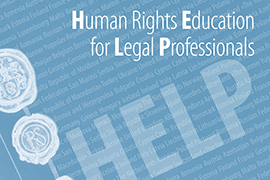Metodologija HELP obuke
The HELP methodology and resources are systematically used in all Council of Europe capacity building activities on the ECHR, organised in the beneficiary countries, including within the framework of EU/CoE Joint Programmes.
HELP organises train the trainers sessions, with the aim to increase ownership by national training institutions.
The HELP methodology takes into account the heavy time pressure imposed on legal professionals in their daily work. Its added value is that curricula are drafted on a tailor-made basis, meeting participants’ specific training needs and learning pace, allowing flexibility.

Curricula are developed according to learning objectives. Those reflect the minimum level of requirements expected by the end of the course.
A master curriculum is then adapted by a national tutor to the national legislation and to the type of legal professionals. He/she will also draft a chapter on the implementation of EU provisions and case law at the domestic level.
Interdisciplinary courses including other professionals may be launched under the project (health and medical specialists, etc.).
After the course, an evaluation of the materials is carried out, on the basis of the participants and the tutor’s feedback. The course is also assessed by taking into account the failure rate of assignments, case studies, etc. This ensures that the final curriculum is of high quality and can then be converted it into a self-learning resource, available to any legal professional/user of the HELP platform.
Within a same group, the level of knowledge and interest may differ. That is why each curriculum displays at one level mandatory resources (minimum prerequisites) and optional additional resources for those willing to go further into details.
Furthermore curricula may be integrated in the national programmes of NTIs/BAs as a mandatory training on fundamental rights. In the long term NTIs/BAs will develop curricula in line with the HELP methodology and closer to national users’ needs.
The HELP methodology is cost effective, as distance-learning is less expensive than traditional training through the development of distance and blended learning curricula and their delivery. Indeed, the same materials can be used for many sessions and by a large number of participants.
An average distance learning course lasts 3 months, with a new module being published by the tutor every two weeks.
The main steps can be described as follows:
|
|




